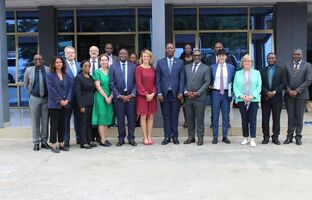As the world prioritizes environmental protection, the Sustainable Landscape through Integrated Management (SLIM) project stands out as a significant initiative in Zambia. Jointly co-financed by the European Union (EU), Sweden and the Czech Republic, this ambitious initiative with a total budget of 7 million euros aims to address the pressing challenges of ecosystem degradation and improve livelihoods through integrated landscape approaches.
The project is implemented by the Czech Development Agency, and it falls under the Green Partnership and Investment Program, strategically encompassing sectors such as agriculture, forestry, biodiversity, water, and climate. Its main focus is to bolster the resilience of ecosystems while simultaneously enhancing the well-being of local communities.
The main areas of focus for SLIM—landscape management, forestry, and data management—intersect in a manner that promotes comprehensive strategies for sustainable practices. It is expected to see a wide application of Czech technological solutions and expertise in satellite landscape mapping, and capacity building of Zambian public institutions and schools and forestry. The Czech Republic is leading this project as the lead partner under the Delegated Cooperation framework, marking the first time the country has taken on a leading role in an initiative of this nature. This will hopefully lead to more comprehensive projects using Czech technology and expertise in 7 priority countries.
One of the core objectives of SLIM is to strengthen governance mechanisms and policies related to the environment and ensure that these policies are interlinked and follow the principles of integrated landscape management (ILM). By aligning with Zambia’s sustainable development goals, the project advocates for a holistic approach, recognizing that economic growth cannot occur in isolation from environmental considerations. This alignment is essential in a country where resource management is often a delicate balancing act involving agriculture, forestry, and mining.
Since its inception in 2023, SLIM has made significant strides, particularly in influencing policy revision in the forestry sector. The project played a critical role in the revision of the National Forest Policy and the Rainwater Harvesting Strategy and through extensive consultations, the ILM concept is now embedded within these major sectoral policies, creating a framework that acknowledges the importance of intersectoral approach regarding landscape management.
SLIM also emphasizes the importance of data in fostering informed decision-making. By advocating for open and FAIR (Findable, Accessible, Interoperable, and Reusable) data, the project developed seven thematic maps that shall eventually, once expanded and validated, enhance disaster response efforts in areas of drought, floods and wildfire. The key in the project implementation is incorporation of advanced technology, such as the Copernicus European Satellite Data, remote sensing, AI as well aligning any geospatial data creation in Zambia with the core principles of the INSPIRE Directive.
SLIM is dedicated to capacity building within key institutions, including the National Remote Sensing Centre (NRSC) and the Forestry Department of the Ministry of Green Economy and Environment. Through two technical working group sessions with key stakeholders that took place in 2024, the project aims to empower personnel and endorse the use of modern equipment. The provision of technological equipment is one of the lined up activities for this year that will be implemented after careful assessment of the technological current capacities and gaps and needs of selected stakeholders. This emphasis on technical and technological capabilities is vital for fostering a culture of ILM, ensuring that Zambia’s approach to natural resource management is both contemporary and effective.
As Zambia continues its journey towards sustainable development, the SLIM project stands as a model for how collaboration between governments, international bodies, and local communities can lead to meaningful change. Under the theme Resilient Landscape, Resilient People, the project not only aims to protect the environment but also seeks to uplift the livelihoods of people, fostering a resilient future where nature and human activity coexist harmoniously.



